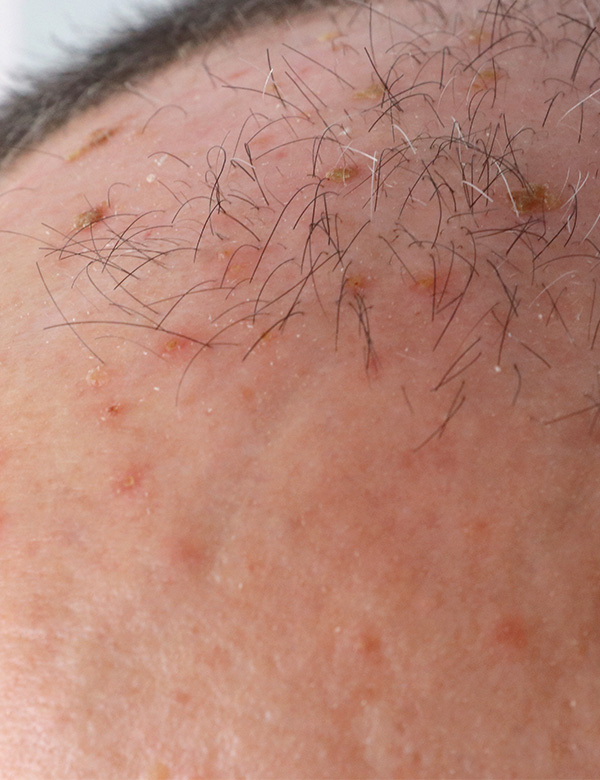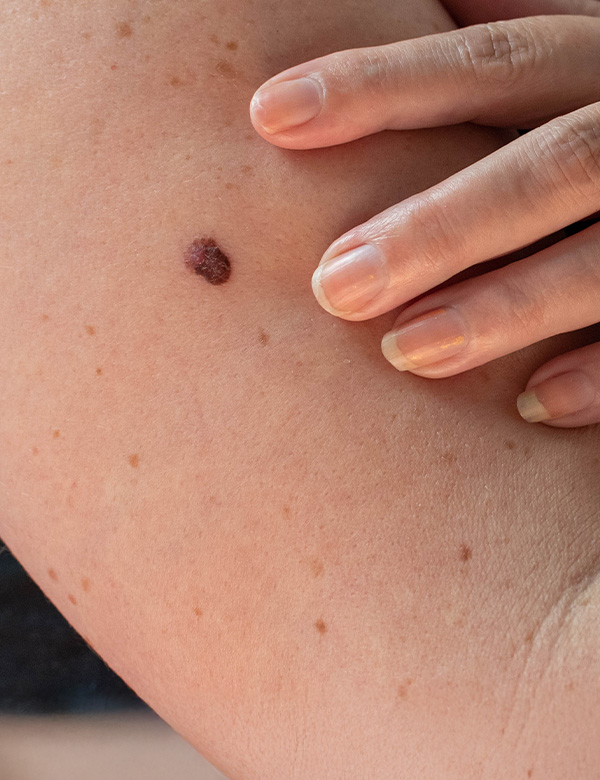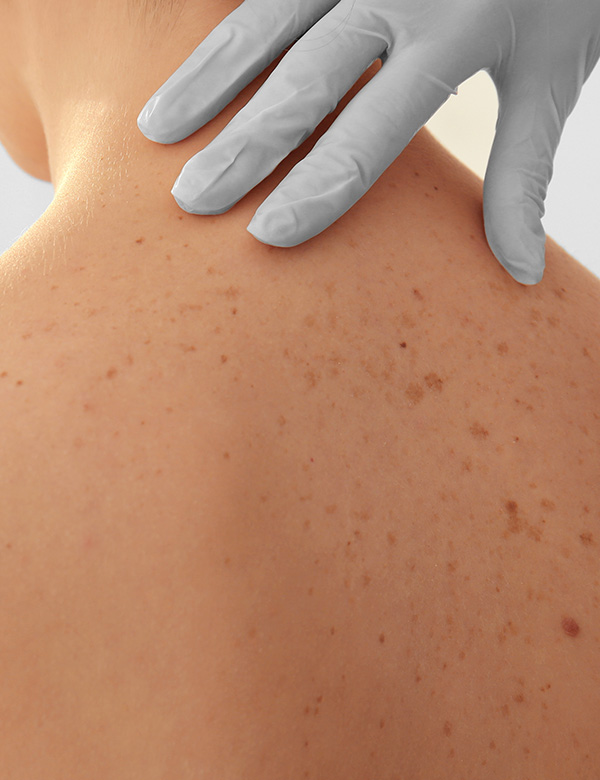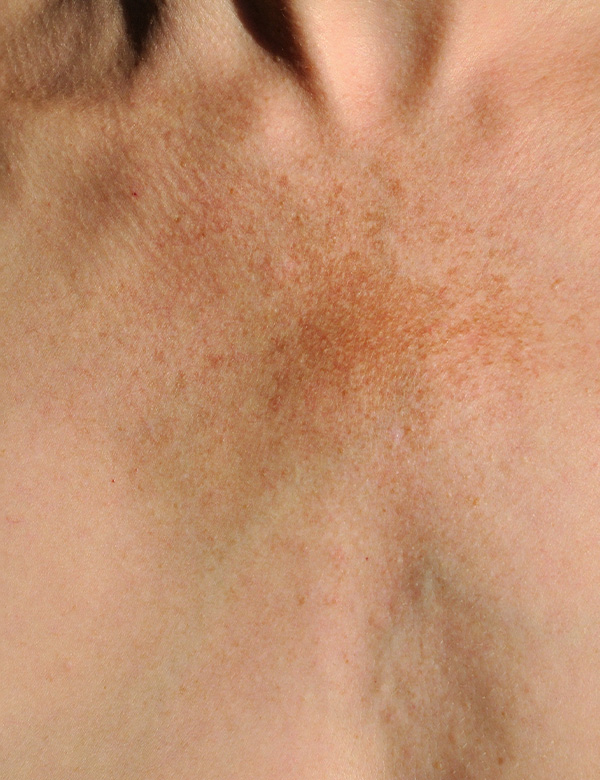White Skin Cancer
Detect and treat white skin cancer (basal cell carcinoma, squamous cell carcinoma) with a specialist dermatologist at Derma Medical Clinic in Zurich - Sihlcity.
White Skin Cancer
Chronische Abszesse und schmerzhafte Knoten durch erfahrenen Hautarzt abklären und behandeln in der Derma Medical Clinic in Zürich - Sihlcity
Early assessment for suspected skin cancer:
Thorough skin examination, digital imaging with AI-supported analysis and, if needed: immediate tissue sampling and on-site specialist treatment.
Examinations
Digital full-body skin screening
Dermatoscopy
Procedure
Personal consultation
thorough examination
immediate tissue sampling if necessary
Duration
between 10 and 30 minutes
What Is White Skin Cancer?
White skin cancer mainly appears in two types: basal cell carcinoma (basalioma) and squamous cell carcinoma (spinalioma).
Common signs of white skin cancer:
- rough, scaly or red patches
- small wounds or lumps that don’t heal
- shiny, pearly skin changes
- crusted or bleeding areas on the skin
This check is especially recommended if you…
- have a non-healing wound on your skin
- notice rough, scaly or crusted spots
- have a spot that bleeds repeatedly or oozes
- see a new skin-colored or reddish lump
- have had white skin cancer before and need follow-up exams
Even without risk factors, we recommend regular skin checks to catch skin cancer early—especially from age 35.

What Is White Skin Cancer?
White skin cancer mainly appears in two types: basal cell carcinoma (basalioma) and squamous cell carcinoma (spinalioma).
Common signs of white skin cancer:
- rough, scaly or red patches
- small wounds or lumps that don’t heal
- shiny, pearly skin changes
- crusted or bleeding areas on the skin
Who Should Get Checked for White Skin Cancer?
This check is especially recommended if you…
- have a non-healing wound on your skin
- notice rough, scaly or crusted spots
- have a spot that bleeds repeatedly or oozes
- see a new skin-colored or reddish lump
- have had white skin cancer before and need follow-up exams
Even without risk factors, we recommend regular skin checks to catch skin cancer early—especially from age 35.
Treatment
During the skin exam at Derma Medical Clinic, your skin is carefully checked using a special magnifying tool (dermatoscope). This helps us see details that are invisible to the naked eye.
We also take high-resolution full-body photos to document and monitor all skin changes.
Computer-assisted analysis using artificial intelligence helps us also detect subtle or hard-to-see changes safely.
What if something looks unusual?
If we spot something suspicious, we can immediately take a small tissue sample (biopsy) on-site. The sample is sent to a specialized lab and analyzed within a few days.
If the suspicion of white skin cancer is confirmed, we offer several treatment options:
Freezing (cryotherapy): the affected area is briefly frozen and heals over the following weeks.
Photodynamic therapy (PDT): a special cream is applied to make diseased skin cells sensitive to light. Light is then used to destroy the abnormal cells.
Surgical removal: Suspicious skin areas are cut out directly in our in-house operating room under local anesthesia.
Laser treatment: abnormal tissue is gently removed with light impulses, minimizing damage to surrounding skin.
How Does the Treatment Process Work?
Personal consultation and risk assessment
We discuss your skin health, any changes, past findings, and your individual risk.
Thorough skin examination
Your entire skin is examined using a special dermatoscope. If needed, we also use digital imaging.
If needed – tissue sampling (biopsy)
Immediate biopsy in the clinic if something looks suspicious.
Treatment
Early stages (e.g. actinic keratoses) are usually treated without surgery. More advanced white skin cancer is surgically removed in our operating room.
Aftercare:
Follow-up exams and personal monitoring depending on your results.

At Derma Medical Clinic in Zurich-Sihlcity, the examination and treatment of skin cancer is carried out exclusively by experienced dermatologists:
- Benjamin Miller, board-certified dermatologist and phlebologist
- Markus Dendorfer, board-certified dermatologist and specialist in pediatric dermatology
Both bring extensive experience in the early detection and modern treatment of skin tumors.

Dr. med. Benjamin Miller
Board-certified Specialist in Dermatology & Venereology FMH

Dr. med. Markus Dendorfer
Board-certified Specialist in Dermatology & Venereology FMH
What to Expect From Us
State-of-the-art diagnostics
Exams with special magnifying tool (dermatoscope), high-resolution full-body images (Fotofinder Full-Body Mapping) and, if necessary, immediate tissue sampling for suspicious skin changes.
On-site surgery and exam room
Unusual skin changes are removed in our own operating room under local anesthesia. We focus on minimally invasive care and achieving optimal cosmetic results.
Fast check-ups for suspicious changes
Suspicious skin areas are examined immediately. If needed, we take a small tissue sample on the spot (biopsy) for fast lab analysis.
Complete care under one roof
If skin cancer is confirmed, removal is done on an outpatient basis with local anesthesia in our own surgical facility.
Scar-minimizing stitching techniques
All procedures are done with special focus on achieving the best possible cosmetic outcome.
Discreet service and comfort
For longer procedures or if monitoring is needed, you’ll have access to a private recovery lounge.
Worried about a rough or non-healing spot on your skin?
Book your skin check appointment now at Derma Medical Clinic in Zurich - Sihlcity.
FAQ – Frequently Asked Questions About White Skin Cancer
What is white skin cancer?
White skin cancer includes two main types: basal cell carcinoma (basalioma) and squamous cell carcinoma (spinalioma). Both usually result from UV damage and tend to appear on areas that get a lot of sun, like the face, ears or hands.
How can I recognize white skin cancer early?
Watch out for skin changes like:
- skin-colored or reddish lumps,
- scaly or crusted areas,
- small wounds that don’t heal or keep bleeding,
- shiny, pearly-looking spots.
What are typical signs of a basal cell carcinoma?
A basal cell carcinoma usually appears as a shiny, slightly see-through bump or as a small wound that won’t heal. It can grow slowly and damage nearby tissue, but usually does not spread.
When should I get a skin change checked?
You should see a dermatologist if a skin spot doesn’t heal, bleeds regularly, grows, or changes in any way over time.
How is white skin cancer diagnosed by a dermatologist?
First, suspicious skin changes are examined with a special magnifying device (dermatoscope). If the area looks concerning, a tissue sample (biopsy) is taken and studied in a lab.
What are the treatment options for white skin cancer?
Depending on the type, size, and location of the tumor, options include:
- surgical removal,
- freezing therapy (cryotherapy),
- photodynamic therapy (PDT),
- laser treatment,
- in rare cases, radiation therapy.
At Derma Medical Clinic, we pick the gentlest and most effective option for your case.
Does a basal cell carcinoma always need to be removed?
Yes. Even though basal cell carcinomas rarely spread to other organs, they can still cause major damage to surrounding tissue. Early removal avoids complications.
Can white skin cancer come back after treatment?
Yes, especially if you continue to get a lot of sun exposure.
That’s why regular skin exams and sun protection are extra important even after treatment.
How can I prevent white skin cancer?
Avoid strong sun exposure, always use sunscreen with a high SPF, and cover exposed skin with clothes or hats.



